We might forgive politicians for putting the “national” interest before the “public” interest. But when the news media makes the same mistake, it is time to be worried.
The Guardian and the ABC rightly pursued the story of Australia’s spying activities on both Indonesia and Timor Leste. Not only have the revelations been embarrassing, they should also cause concern for anyone who values fairness and humanism in international relations.
It is therefore puzzling that News Corp broadsheet The Australian has so vehemently denounced the reporting of Australia’s spying activities. Why would one news outlet – one that so fiercely claims to be a champion of freedom in other realms – be so sharp in its criticism of fellow journalists who are really only doing their job?
The answer – in part – lies in unpacking the conceptualisation of the news media as the “Fourth Estate”, and also in differentiating the “national” and the “public” interest in these matters.
The media as the Fourth Estate
The “Fourth Estate” describes the journalists’ role in representing the interests of “the people” in relation to the business and political elites who claim to be doing things in our names.
The idea of the news media as the Fourth Estate has a chequered history. It began life as a term of abuse for the scurillous and ill-principled scribes of the press gallery at the Palace of Westminister. Conservative Anglo-Irish MP Edmund Burke coined the phrase as a way of mocking the gentlemen of the press.

However, in the intervening centuries, the Fourth Estate has come to mean taking a principled position to – as Australian Democrats senator Don Chipp would have put it – “keep the bastards honest”.
It is with this frame in mind that the news media should approach the Snowden materials and any story that arises from a careful appraisal of the revelations, allegations or speculations they contain.
National interest versus public interest
If we accept the premise of the Fourth Estate, we also have to ask ourselves if the “national” and the “public” interest are the same thing. It might be easy to think that they are, but it would be a mistake.
Both are abstractions and both are problematic. They exist as ideas, but in reality the nation and the public are not homogeneous. In a capitalist world both are divided along class lines. In this context, the national interest is about state secrecy and keeping things from us. On the other hand, the public interest is about disclosure and our right to know. As citizens we are “the people”.
The intellectuals of the 18th and 19th centuries who gave us the conception of the Fourth Estate as a civil watchdog to keep an eye on those in power also provided the philosophical argument for defining the public citizenry and the nation-state as two separate entities with differing interests.
This is clear from the writing of Thomas Paine and others, who pointed out and also acted upon the idea that we may have just cause to overthrow the state if it is seen to be no longer acting in our interests.
Today, governments that claim to act in the “public interest” must face daily scrutiny of their actions. They must be called to account when overstepping the bounds of what citizens will support, or when taking actions that are clearly not in our interests. We rely on journalists and the news media to do this job on our behalf.
This separation between the people and the state becomes more important when the economic interests of the powerful so frequently dominate society. In our modern world, the interest of “the nation” is no more than the collective interest of those who wield political and economic power. Today, the state is the executive branch of the ruling class.
The news media – as the tribune of “the people” – must be constantly on guard and alert to actions of the state, particularly when those actions may harm the interests of citizens.
The Snowden leaks
In the context of the Snowden revelations and, in particular, in relation to the allegations that Australian spy agencies were tapping the phones of the Indonesian president and his wife, we have to ask ourselves: Was that spying really in the interests of ordinary Australians?
We now also know that Telstra is collecting our phone metadata and that it can be accessed by government agencies without a warrant. Can we really see a benefit for ourselves in this action?
The answer to both these questions is a resounding “no”.

The Snowden materials should be published in all their embarrassing detail. Snowden is not a traitor or a “rogue”. He is a principled whistleblower whose actions have uncovered a global system of espionage and surveillance by powerful state security agencies against not only other states and agencies, but against anyone and everyone.
It is our right to be outraged at the actions of state agencies that eavesdrop on our conversations, emails and text messages without our consent. We should be more outraged that the spies and their masters then claim to be taking these actions in our name and in defence of our interests.
The actions of The Australian in denouncing the ABC and The Guardian and defending the government are therefore a complete betrayal of the Fourth Estate principles.
When a newspaper claims to speak to and for the nation – that is, to and for the people – but instead appears to speak for the government, it abandons any claim it may have had to independence of thought and action.

